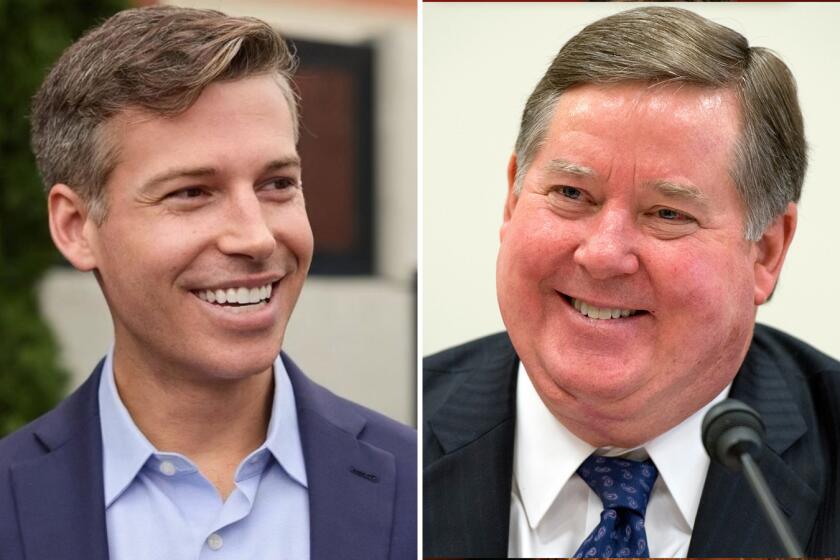Clinton Attacks ‘Brain-Dead Politics’ of Washington : Presidency: He criticizes both GOP and liberals in move to center. Since he still backs new taxes and spending, change may be only rhetorical.
MILWAUKEE — Seeking to redefine himself as the voice of the middle class and the political center, President Clinton on Tuesday assailed the partisan “brain-dead politics” of Washington.
He criticized many in his own party for embracing an overgenerous “politics of entitlement,” while accusing opposition Republicans of practicing a mean “politics of abandonment.”
Clinton has set the new course of his four-month-old Administration between these two shoals after many had charged that he was listing dangerously to the left in his policies and appointments. His appearances here marked the beginning of a new dash for the center of American politics, where Clinton has spent most of his political career.
While his remarks signaled a distinct shift in tone, it remained unclear whether the change would be reflected in policy as well as rhetoric. Clinton’s arguments Tuesday were on behalf of the same programs and philosophy of government he has pursued since taking office--suggesting that the White House believes its recent struggles stem from misperceptions rather than legitimate concerns about its policies and that the remedy may lie in a new marketing approach.
Clinton, for example, continued to defend the need for large tax increases and new spending programs, and there was no announcement of any initiatives designed to attract support from Republicans or moderate Democrats.
In a speech before about 1,500 Milwaukee citizens at the downtown Civic Center, Clinton said: “I was sent to the White House, I think, to take on brain-dead politics in Washington from either party--or from both.”
He said that Democrats have been guilty of promoting big government giveaway programs while demanding nothing in return from the recipients.
The Republicans, he said, have advocated cutting taxes for the wealthy while ignoring the plight of the unemployed and the working class.
“We have to move beyond entitlement and abandonment,” the President said.
He said that the hallmarks of his Administration will be “empowerment” and a “new American community” marked by “offering people more opportunity and demanding more responsibility.”
The speech and a later visit to a family drugstore on the city’s working-class South Side were clearly designed to reposition Clinton once again as the centrist “new Democrat” of the 1992 presidential campaign.
The appearances served to underscore the more moderate cast Clinton is trying to put on his Administration by the appointment over the weekend of political veteran David Gergen to oversee White House communications.
White House political adviser Paul Begala, accompanying Clinton on the trip, said that Milwaukee was chosen as this week’s venue for a sales pitch because it represents the “heart of the Heartland.” He said that it is the perfect place to take the pulse of Middle America and to road test the President’s economic message.
Clinton’s chief challenge over the next several weeks is to secure support for his economic program from Democratic conservatives and moderates in the Senate.
His rhetoric will be aimed at winning the crucial swing votes of about a dozen Democrats in the Senate who believe that his budget contains too many tax increases and too few cuts in government spending.
Accordingly, he told his Milwaukee audience that “the hard work is still ahead” on his budget package and asked his listeners to urge their representatives in Congress to line up behind his program.
“That is why I have asked everyone in Washington to go beyond politics as usual, to forget about partisan divisions, to try to find bipartisan responsibility in place of bipartisan blame and irresponsibility,” he said, addressing himself as much to the 100 members of the Senate as to Tuesday’s audience.
He implicitly acknowledged what everyone knows--that there will be further compromises, special deals and adjustments made before his plan clears Congress.
“This bill’s going to the Senate now,” Clinton said, adding that “everybody in America” would like to see his plan enacted with more budget cuts and fewer tax increases.
Clinton indicated that he is willing to deal but said that there are five basic principles he will insist on retaining in whatever bill finally emerges from the Senate:
* The deficit must be reduced by at least $500 billion and the monies be sequestered in a trust fund reserved solely for deficit reduction.
* Any new taxes must be progressive, falling most heavily on those best able to pay.
* Incentives for people to move from welfare to work must be retained.
* Tax incentives for small businesses, new businesses, cities and research and development must be preserved.
* Programs for children, education, training and defense conversion must be saved to ensure the nation’s economic future.
“None of this is going to be easy, but you should not be discouraged,” Clinton said. “I’m trying to move beyond a bipartisan gridlock which has existed for about a decade.”
More to Read
Get the L.A. Times Politics newsletter
Deeply reported insights into legislation, politics and policy from Sacramento, Washington and beyond. In your inbox three times per week.
You may occasionally receive promotional content from the Los Angeles Times.










